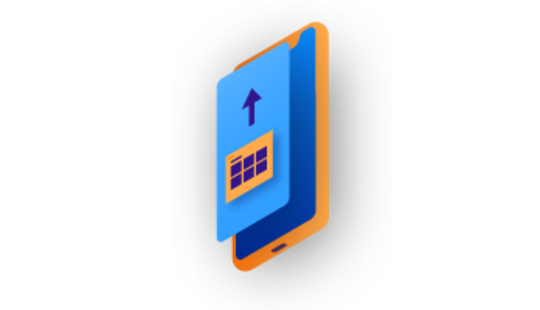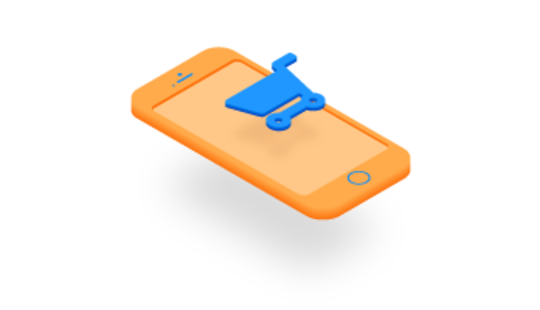-
Product Management
Software Testing
Technology Consulting
-
Multi-Vendor Marketplace
Online StoreCreate an online store with unique design and features at minimal cost using our MarketAge solutionCustom MarketplaceGet a unique, scalable, and cost-effective online marketplace with minimum time to marketTelemedicine SoftwareGet a cost-efficient, HIPAA-compliant telemedicine solution tailored to your facility's requirementsChat AppGet a customizable chat solution to connect users across multiple apps and platformsCustom Booking SystemImprove your business operations and expand to new markets with our appointment booking solutionVideo ConferencingAdjust our video conferencing solution for your business needsFor EnterpriseScale, automate, and improve business processes in your enterprise with our custom software solutionsFor StartupsTurn your startup ideas into viable, value-driven, and commercially successful software solutions -
-
- Case Studies
- Blog
Meet ShopApp, our product that turns your Shopify store into a mobile app
The mobile era is gone. Mobile applications are over.
We bet you’ve seen such bold statements in the news or on blogs. These claims are hard to believe: how is it that mobile apps are over if most of your friends and family have a smartphone and use apps to book hotels and taxis, order food, shop for apparel – you name it?
In fact, no matter what analysts predict, the mobile application market keeps flourishing. Research by Statista shows that the mobile app industry generated as much as $41 billion in gross revenue in 2015. In 2017, this figure increased to $51 billion, and by 2020, global gross revenue from mobile apps is expected to skyrocket to $189 billion.
Online retail is going mobile as well. A Statista report suggests that in 2018, there will be as many as 198 million mobile shoppers in the United States who will generate $470 billion in revenue compared to $320 billion generated from desktop shoppers.
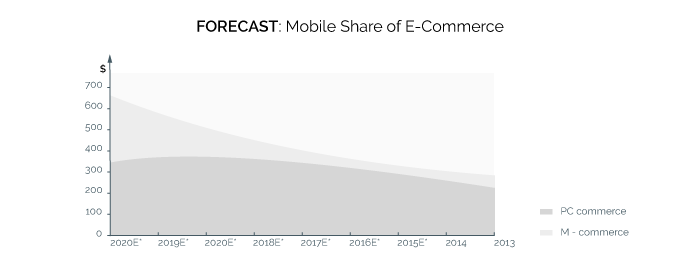
From an end-user’s perspective, mobile apps are the perfect solution for shopping. Apps are always at hand, they instantly notify you about sales and discounts, and they store your settings so you can make purchases faster and more easily. As a result, we see:
- lower cart abandonment rates thanks to the simplified checkout process;
- increased customer loyalty thanks to exclusive and personalized content, rewards systems, 24/7 support, and other factors that retain users and stimulate them to shop for more;
- better conversion rates since customers are more likely to complete a purchase in a mobile app than on a desktop website. Users view more items, add more items to their shopping carts, and complete orders more frequently in mobile apps.
The advantages of mobile apps for your ecommerce business are obvious. So what does it take to build one?
Let's admit it: developing a mobile app can be pricey, especially for Shopify store owners on a shoestring budget.
What can you do if you’ve gotten used to convenient SaaS applications like Shopify that entirely manage your store and take a minimum of time, money, and effort compared to a custom-built store? Our answer is simple: take a look at ShopApp, an application we’ve developed at RubyGarage.
ShopApp allows you to roll out a mobile app quickly and with minimum investment and effort. Interested?
Let’s check out the app!
What is ShopApp?
ShopApp is an open source application that provides an interface for turning your Shopify store into a mobile app.
With ShopApp, you can build both iOS and Android applications so you can reach users of the two most popular mobile platforms.
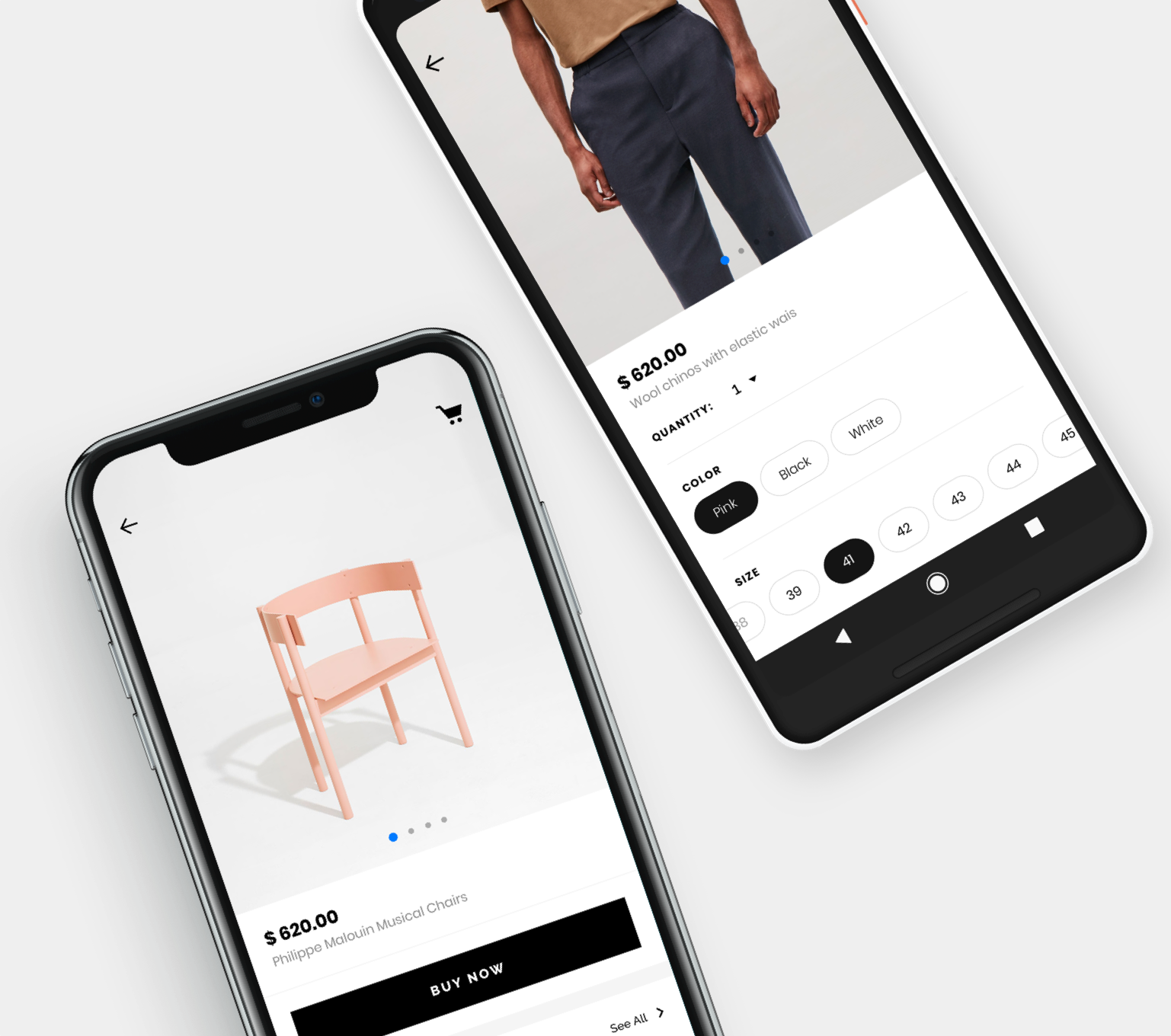
To build a mobile app with ShopApp, all you need is a little help from a developer (for an iOS app, you’ll need a Swift developer, and for an Android app you’ll need a Kotlin developer). Then you just have to pay the fee to submit your app to the App Store or Google Play Store.
Still interested? Let’s discover what features ShopApp offers.
What Features Does ShopApp Provide?
Since the idea of ShopApp is to transfer your web-based Shopify store to a mobile app, all the features that are available to your customers in the original Shopify store are maintained in the mobile app.
Let’s see in detail what you can expect from a store that runs on ShopApp.
Product collections
The product collections you’ve created in your Shopify store are transferred to ShopApp.
Once your store’s items are arranged into neat collections, your customers can easily find what they’re looking for. There are also default collections in ShopApp such as Latest arrivals, so avid shoppers can stay in touch with your latest product updates, and Popular, which features the most-purchased items in your store.
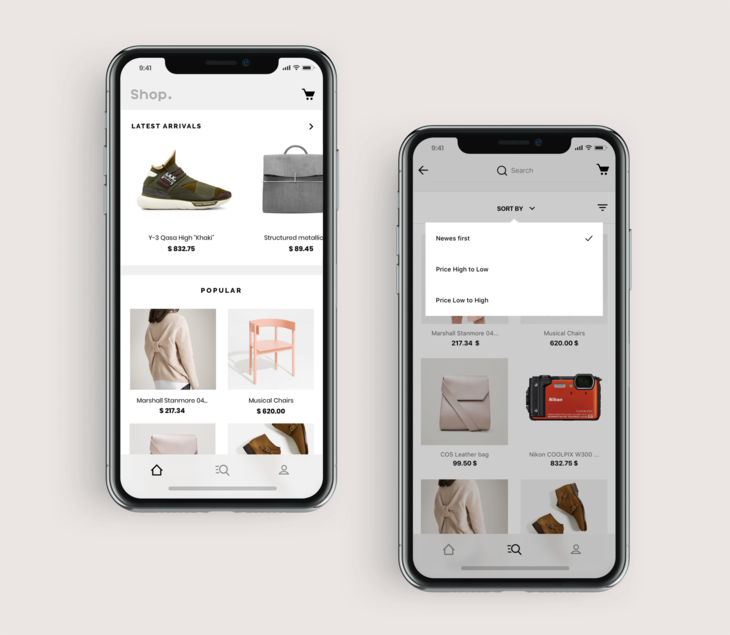
Shopping cart management
ShopApp's shopping cart provides a number of advantages for customers that include fast payments with popular digital wallets, discount codes, cart synchronization, and much more:
- Convenient payments. ShopApp enables fast and convenient payments via Apple Pay and Android Pay. If your customers are used to conventional payments methods, though, they can always pay with credit and debit cards. ShopApp accepts all cards that are accepted by Shopify.
- Synchronized shopping carts. Authorized users can switch between web and mobile stores without losing the items in their shopping carts. ShopApp synchronizes with the web-based version of Shopify, so customers can start shopping on a web and complete their purchase later from an app (and vice versa).
- Discounts and promo codes. If you provide discounts or promo codes, your customers can instantly apply them at checkout. Once users attempt to apply a discount code or a promo code, they’re transferred to a screen that displays the terms of use for the promotion.
- Security of transactions. All transactions are secured with an SSL certificate, so sensitive information like credit cards details and order information is securely protected.
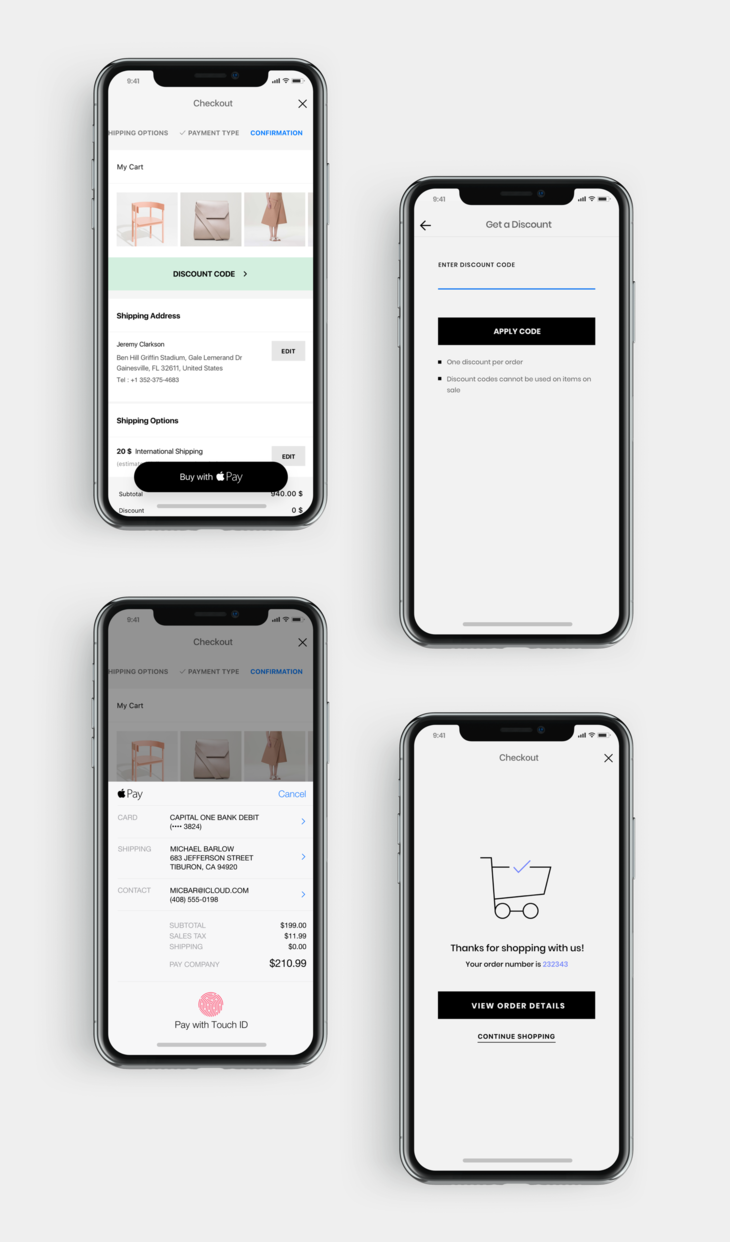
Push notifications
Push notifications are a big advantage of mobile apps. In fact, push notifications can improve app engagement by 88% making your users long-term and loyal customers.
ShopApp allows you to easily create and send push notifications to encourage your customers complete their purchase, check out the latest arrivals or items that go on sale. Notifications are completely customizable: just pick a catchy headline, compose a message, and attach a picture of a product to catch your customers' interest and lead them straight to your app.
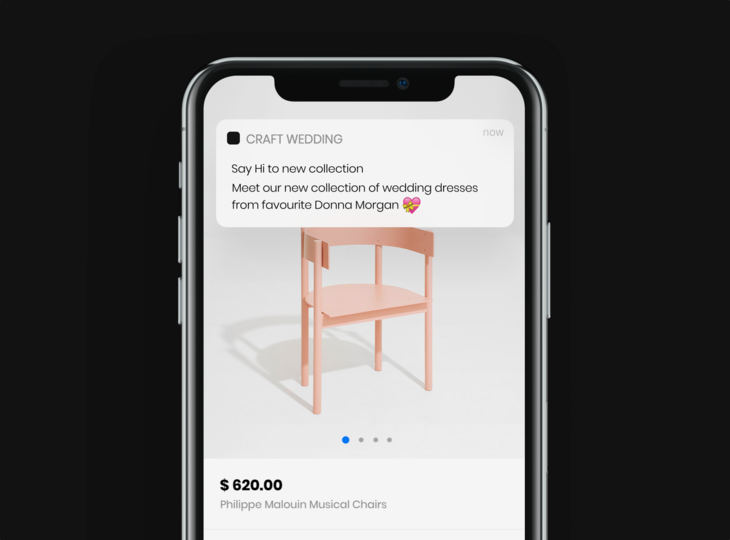
Log in and sign up
To log in, users simply enter their credentials from your original Shopify store. Customer data such as past orders, billing and shipping addresses, and personal details are synchronized so users can easily switch between mobile and web apps. New customers can sign up straight in the app and start making orders.
Personal account management
Сustomers are able to manage their personal accounts in the app. Key information like order history, personal details, shipping and shipping addresses can easily be edited and saved, so customers don’t have to enter these details each time they check out.
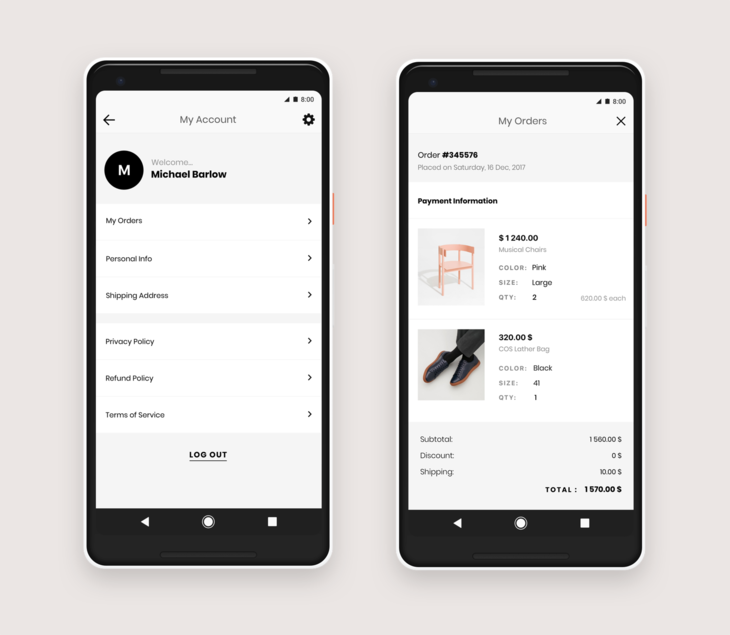
Blog
A blog is a powerful tool for content marketing. If you already run one, then you’ll be able to transfer your existing blog to the mobile app so your customers can view blog posts and keep up with your latest updates.
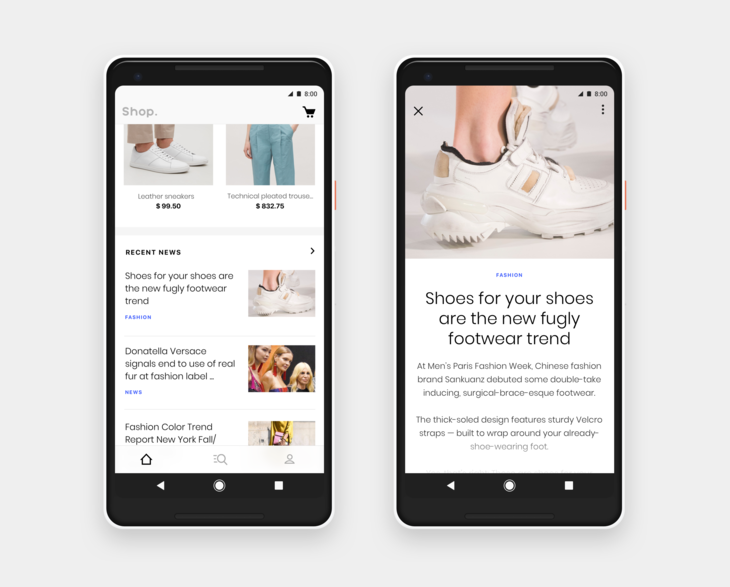
What UI/UX Design Will I Get?
The default ShopApp user interface (UI) is minimalist and sleek. It’s suitable for any kind of store, from fashion and accessories to home goods and decor. The minimalist black and white scheme puts content first and flatteringly showcases your products.
The UX design aligns with best practices for m-commerce stores. Checking out involves a minimum of steps so your customers are more likely to successfully place orders. Product images take up a substantial part of the device screen so users can see products in detail and swipe through the image gallery to see products from all angles. As ShopApp is open source, you can also completely customize your application’s design to make your store unique and recognizable.
What Are the Benefits of ShopApp?
It’s open source
Open source software is publicly accessible, and anyone (of course, you do need some technical skills) can contribute to it. The point of developing open source software is to exchange knowledge and skills, build collaboratively, and promote a community-driven approach to software development.
Actually, the community is the locomotive engine of open source software. The community develops software, maintains it, and in most cases shares the codebase without charging any fees. Since open source software is created collaboratively, programmers are highly motivated to deliver top-notch software. The stakes are high: everyone can see each other’s code, so it’s important to push only quality, clean, and maintainable code that will be positively recognized by peers.
As the result, open source software is considered more reliable, secure, and efficient than proprietary software released by enterprises.
It’s customizable
Open source software is completely customizable, so you can take the code, modify it to meet your specific needs, and create as many versions as you wish. When customizing open source software, you’re only limited by your imagination and your budget; the rest is handled by developers.
A store running on ShopApp can be completely customized and extended with your desired functionality. Once you feel like enhancing the UI or integrating some useful features, our team can help you with that.
It’s cost-effective
As we mentioned earlier, open source software is usually distributed for free. ShopApp is entirely free, which means that it can be tweaked and distributed for commercial purposes.
Because ShopApp’s code is totally free, it won’t cost you an arm and a leg to develop an app. You’ll only have to pay for a developer to set up your store, customize it (if you wish), and push the application to the App Store or Google Play Store.
It’s fast to launch
ShopApp is about speed. Building a simple mobile app may take up to four months. With ShopApp, you don’t have to sacrifice your time to get a result. Instead, you can simply use ready-made code to deliver the functionality you need.
ShopApp enables you to focus on things that really matter (like marketing your products or enhancing your customer experience) and get a ready mobile application several times faster than with a custom solution.
Wrapping Up
With ShopApp, it takes little time and effort to launch your own mobile app for your Shopify store. Remember that ShopApp is open source software, so it’s completely free; you only have to pay to list your app on the App Store or Google Play Store. Besides, our RubyGarage team can help you set up your accounts and submit your app to both of these stores.



